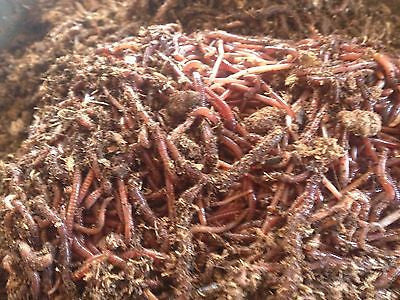Increase Soil Wellness Normally With Red Wigglers
The combination of red wigglers right into soil management techniques offers a compelling method for boosting soil wellness normally. These earthworms not just transform organic waste into valuable vermicompost, but their natural behaviors likewise promote boosted dirt structure, oygenation, and nutrient schedule.
Benefits of Red Wigglers

Additionally, red wigglers enhance dirt structure by producing channels as they burrow with the earth. This activity boosts aeration and drain, facilitating origin development and making sure that plants obtain ample oxygen and wetness. In addition, the castings generated by red wigglers are high in nutrients such as nitrogen, phosphorus, and potassium, which are vital for plant advancement.
Red wigglers also help in the reduction of harmful microorganisms and pests by outcompeting them for sources, even more contributing to a much healthier soil atmosphere. Their existence can bring about a decrease in the demand for artificial plant foods and pesticides, advertising sustainable farming techniques. Generally, incorporating red wigglers into dirt administration methods supplies a natural and efficient methods of boosting soil vitality, consequently sustaining robust plant development and agricultural efficiency.
Setting Up Vermicomposting
Establishing a vermicomposting system is a sensible method to harness the exceptional benefits of red wigglers in enhancing dirt health. red wigglers. To begin, select a suitable container-- preferably, a plastic or wood bin with a cover to maintain wetness and temperature. The container ought to have drain openings to avoid excess water buildup
Following, prepare bed linens material, which functions as an environment for the worms. Suitable products consist of shredded newspaper, cardboard, or coconut coir. Go for a depth of 4-6 inches to supply appropriate space for the worms.
Once the bedding is in area, present the red wigglers, usually at a proportion of one extra pound of worms for every square foot of surface in the container. Following this, include kitchen area scraps such as vegetables and fruit peels, coffee premises, and crushed eggshells. Stay clear of meat, dairy, and oily foods, as these can attract parasites.
(red wigglers for sale)
Taking Care Of Your Worms
Maintaining the health of your red wigglers is important for a successful vermicomposting system. Proper care guarantees that these helpful organisms can efficiently damage down raw material and enhance your dirt. Begin by supplying an appropriate habitat; a well-ventilated container with a wet, dark setting is crucial. Go for a bed linens product that consists of shredded newspaper, cardboard, or coconut coir, which should be maintained damp however not filled.
Feeding your worms is another crucial element of their treatment. Red wigglers grow on cooking area scraps such as fruit and vegetable peels, coffee grounds, and crushed eggshells. Stay clear of feeding them citrus fruits, onions, and milk products, as these can produce an unwelcoming setting. Display the quantity of food you offer to avoid overfeeding, which can result in odor problems and draw in insects.
Temperature level administration is essential; worms choose a range of 55 to 77 degrees Fahrenheit. By following these standards, you will certainly promote a healthy and balanced ecosystem for your red wigglers.
Utilizing Worm Castings in Dirt
Worm castings, commonly described as "black gold," are an effective modification that can significantly enhance dirt health and wellness and fertility. red wigglers. These nutrient-rich, natural fertilizers are produced by red wigglers throughout their food digestion process, leading to a finely textured material that is advantageous for plants and dirt alike
Incorporating worm spreadings right into your soil boosts its framework, improving aeration click for source and water retention. This is specifically helpful for sandy soils that drain pipes too rapidly, in addition to heavy clay soils that can come to be compacted. Additionally, worm castings are replete with essential nutrients, including nitrogen, phosphorus, and potassium, which are important for plant development.

Eventually, making use of worm castings fosters a flourishing environment within the soil, resulting in healthier plants and even more sustainable horticulture methods.
Tips for Successful Composting
Successful composting needs mindful attention to a couple of vital concepts that can significantly improve the top quality of the end product. First, equilibrium is vital; keep an appropriate proportion of green products (nitrogen-rich) to brown materials (carbon-rich), ideally around 1:3. This equilibrium promotes effective disintegration and lessens odors.
Second, oygenation plays a vital role. Regularly turning the garden compost heap enhances oxygen flow, which increases microbial activity and speeds up the composting procedure. Go for a stack dimension of at the very least three feet by three feet to retain warmth, which better promotes decomposition.
(buy red wiggler worms)
Dampness material is an additional necessary element; the compost must perspire but not soggy. A good rule of thumb is to attain a dampness degree similar to that of a wrung-out sponge. Also much water can lead to anaerobic problems, while insufficient can reduce decay.
Lastly, monitor the temperature level of the garden compost. A temperature series of 130 ° F to 160 ° F suggests active composting and aids eliminate virus and weed seeds. By sticking to these concepts, you will create a nutrient-rich garden compost that supports soil wellness and boosts plant development.
Conclusion
Including red wigglers right into horticulture methods boosts dirt wellness through natural processes. These worms add to the failure of natural materials, resulting in nutrient-rich vermicompost that improves dirt structure and fertility. Their tunneling activities promote aeration and drain while reducing harmful pathogens and parasites. By developing and keeping a vermicomposting system, garden enthusiasts can foster a lasting environment that sustains robust plant development and long-lasting dirt resilience, ultimately benefiting agricultural performance and ecological health.